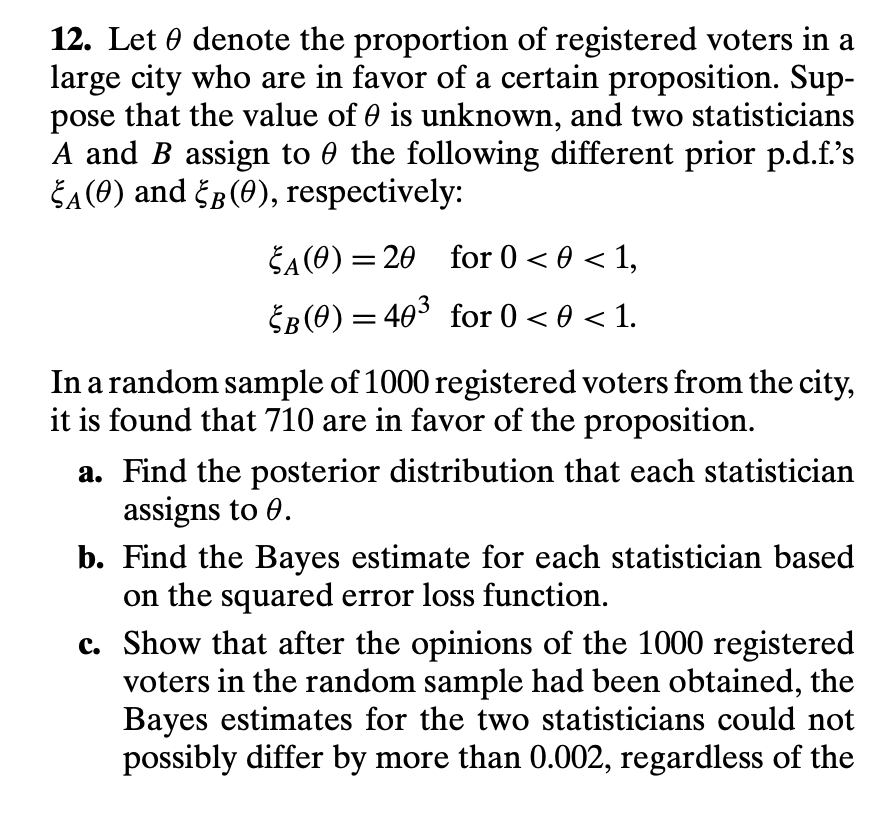12. Let 0 denote the proportion of registered voters in a large city who are in favor of a certain proposition. Sup- pose that the value of 0 is unknown, and two statisticians A and B assign to 0 the following different prior p.d.f's ŠA(O) and Šp(0), respectively: ŠA(O) = 20 for 0 < 0 < 1, ŠB(0) = 403 for 0 < 0 < 1. In a random sample of 1000 registered voters from the city, it is found that 710 are in favor of the proposition. a. Find the posterior distribution that each statistician assigns to 0. b. Find the Bayes estimate for each statistician based on the squared error loss function.
12. Let 0 denote the proportion of registered voters in a large city who are in favor of a certain proposition. Sup- pose that the value of 0 is unknown, and two statisticians A and B assign to 0 the following different prior p.d.f's ŠA(O) and Šp(0), respectively: ŠA(O) = 20 for 0 < 0 < 1, ŠB(0) = 403 for 0 < 0 < 1. In a random sample of 1000 registered voters from the city, it is found that 710 are in favor of the proposition. a. Find the posterior distribution that each statistician assigns to 0. b. Find the Bayes estimate for each statistician based on the squared error loss function.
Elements Of Modern Algebra
8th Edition
ISBN:9781285463230
Author:Gilbert, Linda, Jimmie
Publisher:Gilbert, Linda, Jimmie
Chapter2: The Integers
Section2.7: Introduction To Coding Theory (optional)
Problem 6E: Suppose the probability of erroneously transmitting a single digit is P=0.03. Compute the...
Related questions
Question

Transcribed Image Text:12. Let 0 denote the proportion of registered voters in a
large city who are in favor of a certain proposition. Sup-
pose that the value of 0 is unknown, and two statisticians
A and B assign to 0 the following different prior p.d.f's
ŠA(O) and Šp(0), respectively:
ŠA(O) = 20 for 0 < 0 < 1,
ŠB(0) = 403 for 0 < 0 < 1.
In a random sample of 1000 registered voters from the city,
it is found that 710 are in favor of the proposition.
a. Find the posterior distribution that each statistician
assigns to 0.
b. Find the Bayes estimate for each statistician based
on the squared error loss function.
c. Show that after the opinions of the 1000 registered
voters in the random sample had been obtained, the
Bayes estimates for the two statisticians could not
possibly differ by more than 0.002, regardless of the

Transcribed Image Text:number in the sample who were in favor of the prop-
osition.
Expert Solution
This question has been solved!
Explore an expertly crafted, step-by-step solution for a thorough understanding of key concepts.
This is a popular solution!
Trending now
This is a popular solution!
Step by step
Solved in 6 steps with 6 images

Recommended textbooks for you

Elements Of Modern Algebra
Algebra
ISBN:
9781285463230
Author:
Gilbert, Linda, Jimmie
Publisher:
Cengage Learning,

Algebra & Trigonometry with Analytic Geometry
Algebra
ISBN:
9781133382119
Author:
Swokowski
Publisher:
Cengage

Elements Of Modern Algebra
Algebra
ISBN:
9781285463230
Author:
Gilbert, Linda, Jimmie
Publisher:
Cengage Learning,

Algebra & Trigonometry with Analytic Geometry
Algebra
ISBN:
9781133382119
Author:
Swokowski
Publisher:
Cengage